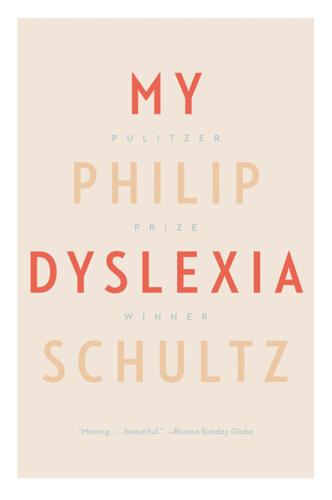
My Dyslexia
- اطلاعات
- نقد و بررسی
- دیدگاه کاربران
نقد و بررسی

Starred review from August 8, 2011
"Art's power of persuasion resides in the small personal details of one's own story, and if it weren't for my struggle with dyslexia, I doubt I'd ever have become a writer or known how to teach others to write." In this touching memoir, Pulitzer Prize-winning poet Schultz (Failure) tackles his struggle with dyslexiaâa condition he only learned he had when his son was diagnosed. Schultz paints a precise and compelling picture of how his brain works, how he sees himself, and how he thinks others have seen him throughout his life. As an adult, he finally recognized his own worth: "Perhaps I was someone whom others could admire, someone more than a permanent member of the Dummy Class?" From its impact on family members, to difficulties in school that may or may not be resolved with diagnosis, to its effect on social interactions and relationships, Schultz describes how dyslexia touches all areas of life. His affecting prose will inspire compassion and leave readers with an understanding not only of dyslexia, but of the lifelong challenges that someone with disabilities may face.

July 1, 2011
Writers have a way with words. In the case of this writer, winner of the Pulitzer Prize for poetry in 2008, words are more likely to have their challenging way with him.
In a memoir as brief as a poem, Schultz (Failure, 2007, etc.) reflects on his dyslexia, a lifelong disability that was not diagnosed until late into his adulthood. He learned, with difficulty, to read at age 11. He was generally regarded as simply a stupid youngster. His mother had faith that her only child was truly bright, but his father was not helpful. The boy's different neurological wiring produced a lonely, unresponsive child, and he was invited by his school's administration to leave. And yet the poet survived, learned to process information and to read and write—though it's not easy, even now. Schultz would like, mostly, just to be left alone to cogitate in his own way. Reading still does not come quickly. The author loves books, he writes, "except actually reading them." Yet he demonstrates a lambent, odd contact with words: "Anything whispered, insinuated or abbreviated becomes in my mind a mumble-jumble bargain-basin [stet] gibberish." His memoir, jogged into realization when he followed his Pulitzer Prize with an address at a school for the learning disabled, was not effortless. Today he heads a school that teaches writing. The author recognizes that his teenage son shares the same diagnosis, but this is his own story, not his child's. Is the very notion of a dyslexic author an anomaly? How does the mind of a dyslexic work? Here, at least, are the answers for one man alone.
Under the rubric of "inspirationally instructive," Schultz offers a compact book. Yet, writing with a focused mind, he dilates at length on the struggle within that mind.
(COPYRIGHT (2011) KIRKUS REVIEWS/NIELSEN BUSINESS MEDIA, INC. ALL RIGHTS RESERVED.)

September 1, 2011
One can come away from Schultz's Pulitzer Prizewinning Failure (2007) wondering about its title. The life, essentially Schultz's, that its poems report is full of struggle and hard knocks but, characterized by resiliency, doesn't seem a failure. Maybe its bouts of clinical depression are what Schultz means by the title, but modern sensibilities recoil from calling illness failure. This brief memoir dispels the mystery as affectingly as the poems conjured it. Schultz is dyslexic. It took him years longer than usual to learn to read and requires much more effort to apprehend speech. In short, he has a severe learning disability, unconfirmed until he was 58after his dyslexic elder son's diagnosis. More than once he says that a special cruelty of dyslexia is that those suffering it lose patience with themselves and come to consider themselves inferior to normal people. This is the failure that dogs him as persona of his poems and subject of this book, a worthy peer of Daniel Tammet's eloquent record of his autism, Born on a Blue Day (2007).(Reprinted with permission of Booklist, copyright 2011, American Library Association.)




دیدگاه کاربران